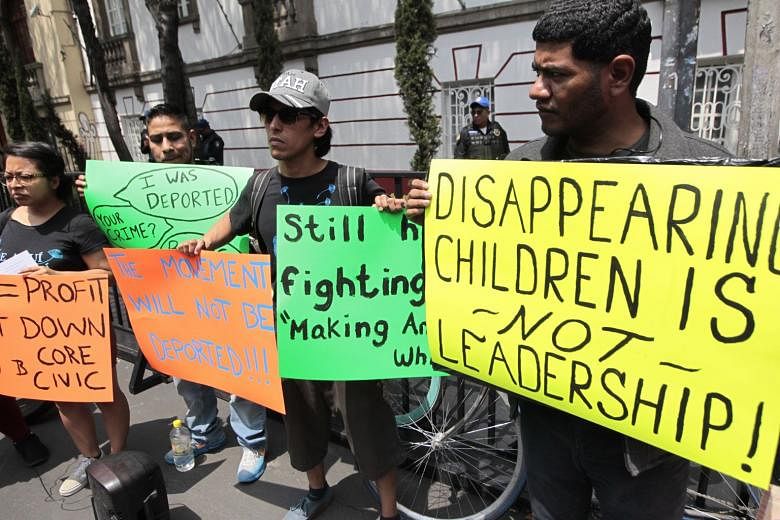MEXICO CITY (WASHINGTON POST) - US Secretary of State Mike Pompeo and a group of high-level White House officials met Mexico's incoming president on Friday (July 13) as protesters gathered outside with signs slamming President Donald Trump's migration policy.
In an unusual display of administration force, Pompeo came to the Mexican capital accompanied by Department of Homeland Security Secretary Kirstjen Nielsen, Treasury Secretary Steven Mnuchin and presidential adviser Jared Kushner, Trump's son-in-law.
After meeting with the current president, Enrique Pena Nieto, the US officials drove to the campaign headquarters of the leftist-populist victor in this month's election, Andres Manuel Lopez Obrador, who greeted the delegation under a drawing of Benito Juarez, a peasant who became president and is a national hero.
The heavyweight lineup was designed to show the importance the administration places on US-Mexico relations in the face of great stresses, including divisions over trade, a migration crisis at the US-Mexico border and a long history of incendiary statements from Trump about Mexico and the people who live here.
"As you can see, Senor President, America greatly values our relationship with Mexico," Pompeo told Lopez Obrador.
"You have four of the most senior leaders here.
"Just after you were elected, we wanted to come down here to let you know that President (Donald) Trump cares deeply for the success of the relationship between our two countries. Our presence here today signals that to you. We know there have been bumps in the road between our two countries, but President Trump is determined to make the relationship between our peoples better and stronger."
Relations between the two countries are at their lowest point in decades.
Trump has threatened to walk away from the North American Free Agreement (Nafta), and place higher taxes on autos built in Mexico. Trump has been unpopular in Mexico since his campaign days, when he called Mexicans rapists and drug dealers, and vowed that Mexico would pay for a border wall.
Things have only grown more tense in the midst of a border crisis precipitated by the administration's "zero tolerance" and family separation policies. Pena Nieto's office released a statement saying he had urged the visitors to quickly reunite the divided families.
The pain of migrants dogged Pompeo and his group throughout the visit.
Protesters stood outside Lopez Obrador's headquarters chanting as the US delegation arrived. Some held signs reading, "Fear is not a policy" and "America is not white and never will be."
One man stood with a hand-lettered sign reading, "I was deported. My crime? Being brown."
Lopez Obrador also was highly critical of Trump during the election, but in recent months he has struck a more conciliatory note. He even has invited Trump to his inauguration, along with Canadian Prime Minister Justin Trudeau.
Although the president-elect's encounter with Pompeo had mostly been framed as a courtesy visit, Lopez Obrador himself said earlier this week that Nafta would be a topic of conversation, along with migration and development projects.
Lopez Obrador had previously said on multiple occasions that he wants to keep Nafta in place.
"We are going to be observers at this time," Lopez Obrador said about Nafta on Tuesday.
"We agree with and recognize what the negotiating group has done, what Mexican officials have done in dealing with these issues and we are going to be with them as observers to support them and so that a good agreement, a good treaty, is achieved."
Marcel Ebrard, who is pegged to be the next foreign minister, said earlier this week that the border wall proposed by Trump would not be part of the agenda.
US officials had said all topics of mutual interest were on the table, but declined to be more specific.
The United States has been increasing pressure on Mexico to grant asylum to more Central Americans, potentially deterring them from continuing north to the United States.
Known as a "safe third country agreement," the United States wants to provide significant financial aid to Mexico if it agrees.
But Mexican officials have rejected all proposals so far.
"The meeting with Pompeo is the first serious foreign policy test for Lopez Obrador," said Rodolfo Soriano-Nunez, a sociologist and political observer in Mexico City.
"I believe it provides his team, especially Ebrard, with an opportunity to the terms of the relationship between now and Lopez Obrador's swearing in."
"Much of the collaboration between the United States and Mexico happens on terms that I don't suppose are to Lopez Obrador's liking," Soriano-Nuñez said.
"They're very abusive and disrespectful towards Mexican sovereignty. On the other hand, without that cooperation the position of Mexico would be more complicated." E
Ebrard later described the atmosphere at the meeting as "very good, excellent," but said the two teams did not discuss the issues between them in detail.

